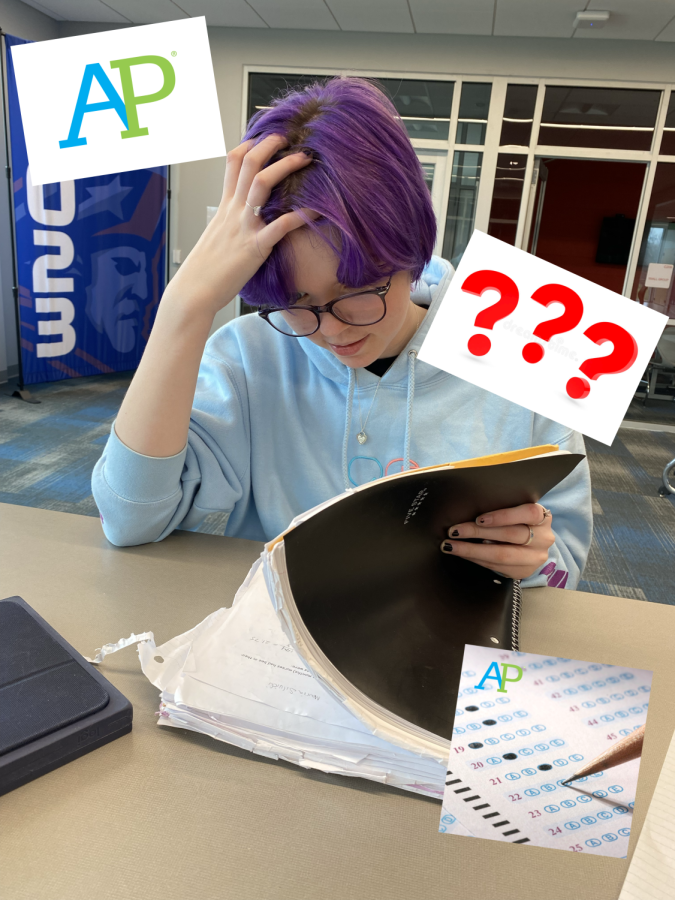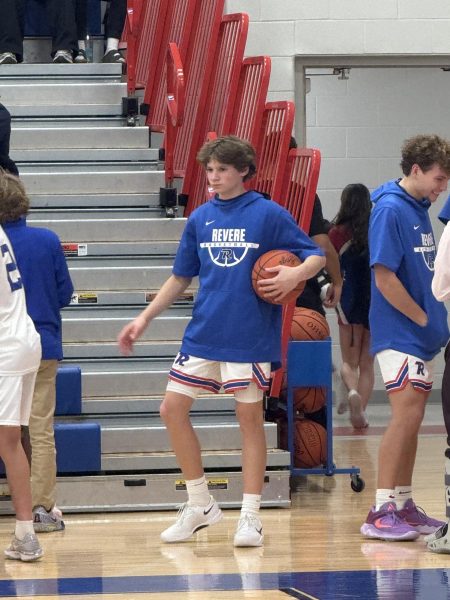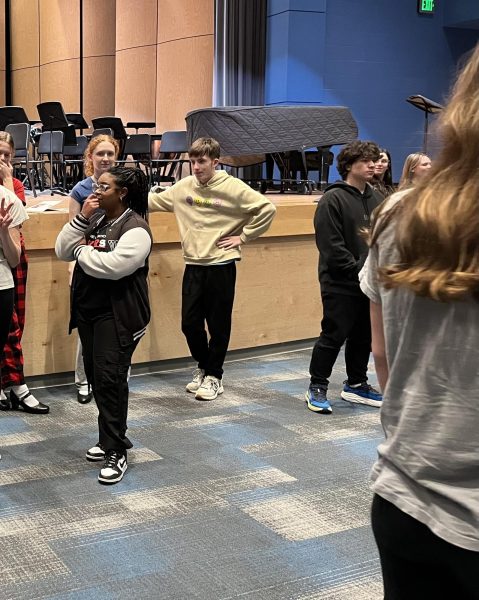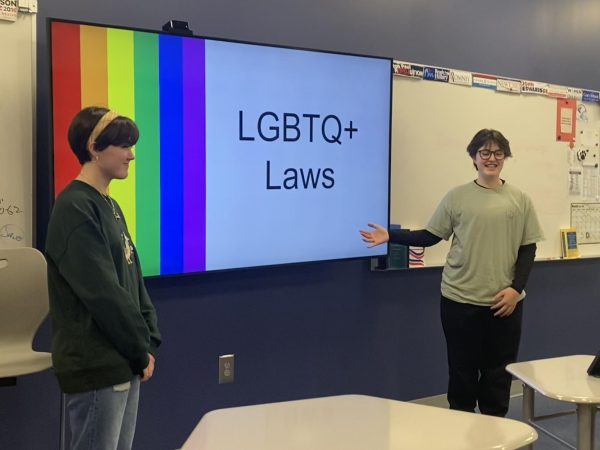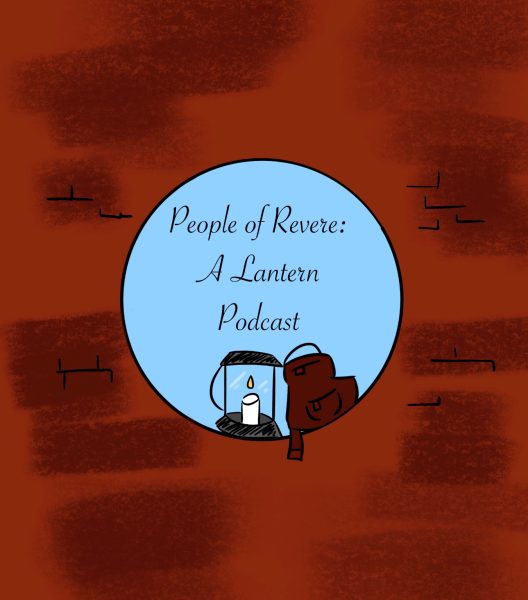RHS features AP classes
A high school counselor is given the opportunity to run the AP classes at her school. The amount of classes available were small for the students to choose from. The counselor knew that it was her goal to expand their AP program during her time working at the school. Years later, the counselor met her goal so that students have a wider variety of AP classes to choose from. The counselor then headed off to Revere with a strong background working with AP exams. Rion is now planning to make her mark at Revere High School. Students take Advanced Placement (AP) classes in order to prepare for the test in May. Revere offers a variety of AP classes to students. Learning more about the different classes’ material and how they prepare students could stop the negative stigma around taking the AP test.
School Counselor Emily Rion is the coordinator for AP testing. She explained how she was given this role when she was hired at Revere.
“Just like many roles and responsibilities that folks have, I have been coordinating for AP exams since I started as a school counselor thirteen years ago. When I was hired [at Revere] as a school counselor, that was one of the things [the administrators] saw I had experience to do,” Rion said.
AP Classroom is the portal every AP class uses to prepare for the AP test by filling out information or taking practice tests for that class. Rion’s involvement with the AP Classroom started in August.
“[On] August first, I am signing on and logging in and making sure that I know that my AP codes, [which] can either be created by teachers or I can do that myself,” Rion said.
Once the students entered school, Rion made sure they registered into AP classrooms.
“Once we get into school, I am reaching out to teachers and reminding them to set up their own codes. If they feel more comfortable with me setting up the code for the classroom, then they do so because it’s imperative that the students sign up right away because this orders the test,” Rion said.
Rion also deals with classes like AP Drawing that have different steps for AP setup.
“It gets a little bit tricky when you are ordering the portfolios for the art classes because they have to have their own separate codes; they have their own separate portal. I work closely with Mr. Pierson and all the AP [Drawing] kids,” Rion said.
After students sign into the AP Classroom, Rion manages fees to pay for all the tests.
“Throughout the process of ordering tests I oversee [and purchase] the order for the district. . . test fees that I know I have to manage,” Rion said.
All of this money goes to the College Board so that students can receive their test during those few weeks. Sometimes the district receives money from the board in case a student is not able to pay the fee for the test.
“We as a district do not see any of the money if we do get a reimbursement check; it’s called a coordinator’s reimbursement check. I give that back to the district so that students who can’t afford to pay for their fees [can pay the fee]. This isn’t something I get paid to do,” Rion said.
After fees and test orders are completed, Rion talks with people who work at St. Victor’s to get the extended location for testing and also finds people to become proctors during the school day.
“I’m working with St. Victor’s to make sure I have enough tables and enough space. I’m working with our administration to make sure I have enough proctors for the days because there are many times that run through the day, [but] I can’t leave my responsibilities as a school counselor cause that’s not fair to my students, so I ask [for] help with that,” Rion said.
Rion finds that St. Victor’s is a perfect extended location for testing and is glad this is available for students taking the test.
“St. Victor’s is a phenomenal place to work with, and it’s great because St. Victor’s is super quiet and there are less distractions. I don’t have to worry about bells, kids, lunches . . . . We are very fortunate we have such a great partnership with them,” Rion said.
People outside of the district also come to Rion to take AP tests. This could be either students or parents coming to her to sign up to take the test at Revere.
“People will reach out to me, like kids from different areas, private schools/homeschool kids, whether their school isn’t offering the AP exam or their school is saying no, they won’t order it. I will get requests from them or their parents to take the AP exam. I won’t turn a kid away from the possibility of taking an exam. I know that it’s helpful for them, so I’ll just add it to our order and they will send me a check [then the student will] show up for the exam,” Rion said.
Rion believes that Revere is very fortunate as a district to have this developed program for students who want to take AP classes at the school compared to other districts.
“The previous district that I was at when I first started there my first year there was back in 2009-10; we only offered 11 AP classes. [Revere] offers 18 AP classes here and 24 actual tests,” Rion said.
Rion explained why that district did not have as large of an AP program and how much it developed by the time she left.
“We didn’t have the teaching staff that was necessarily qualified for the teaching, and then by the time I left, we had grown the program up to 16-17 classes which was cool,” Rion said.
After students take their AP exams, Rion will offer an ice cream social to celebrate students’ accomplishment of taking an AP exam.
“This year, I’m going to do a little ice cream social for our AP students. I think that that’s a really great thing. If there’s an opportunity to celebrate anything anytime, I think we should do so after the last exam,” Rion said.
Most classes have a similar set up with the test but completely different material for different subjects.
Eric Browne’s AP Psychology class is known for its unusual content. Browne explained how the AP Psychology test is set up.
“[The] two parts [are] pretty straight forward: a hundred multiple choice questions and the second part is two free response questions (FRQs),” Browne said.
Being one of the shorter AP tests, AP psychology tests challenge students’ ability to manage time.
“You get seventy minutes for the hundred multiple choice questions, and you get fifty minutes for the two FRQ questions,” Browne said.
Browne explained how he prepares his students closer to the test.
“For about three weeks prior, we finish new material up until about mid-April, and then there is about three weeks that we just do review. At that time, we will take practice tests on AP Classroom because the AP Classroom has questions from previous AP exams,” Browne said.
Browne talked about why students should take a class like AP Psychology.
“[In] the course, you learn a lot about people, but you learn a lot about yourself. Whether that’s emotions, memory or mental health, just behavior in general, you learn a lot about rare conditions and things you might not have but you also learn about everyday things. The class can be very empowering to know ‘why do I do this? Why do I think like this?’ There are a lot of people there in the same position and here is how to deal with that,” Browne said.
One AP class that has a different test set up to the others is AP Drawing and AP 2D Design.
Bob Pierson is the teacher for all AP art classes at Revere. Many skills students need for the AP class are used in the prerequisites, Elements of Art and Drawing and Design.
“The reason I do it that way is because Drawing and Design is a prerequisite for AP drawing and a lot of skills developed in that class and some in elements are shading, color wheel, knowing how to use color pencils . . . All the skills you need for an AP portfolio, which is college level drawing, is begun in Elements of Art [and] continued in Drawing and Design,” Pierson said.
There are two different types of AP art: AP Drawing and AP 2-D Art and Design.
“AP Drawing is taken by juniors and seniors. Juniors returning after having a portfolio do a 2-D design portfolio, which is a combination of painting, collage, mixed media, perhaps digital it’s a mixture of things,” Pierson said.
In both classes, you spend time creating a portfolio to turn in as a part of the AP test. There are 15 works in total, but 5 of those works are to be considered as qualities to turn in physically at AP Central. The fifteen works are considered a sustained investigation.
“There is a subject chosen by the student to investigate that could be conceptual or it could be technical. Those 15 works and the five qualities, which the five qualities can be part of, contribute to the whole portfolio,” Pierson said.
The last component of the art submission is the written explanation. About 40% of the score is the written explanation explaining your sustained investigation and how you accomplished your investigation.
“In years past, the written part wasn’t included at all. You had a written part, but it didn’t contribute to the score; now it’s a substantial part,” Pierson said.
Pierson recommends anyone going to art school or who has completed Drawing and Design to consider taking AP art classes.
Besides these two, many of the AP classes have the same test set up but teach different material. One subject that offers AP testing is English. Alan Silvidi teaches AP Language and Composition and explained the difference between AP English Language and Composition and AP Literature and Composition.
“I teach AP [English] Language [and Composition]; it’s a non-fiction based class, and it’s based on rhetorical analysis instead of literary analysis,” Silvidi said.
Silvidi talked about the different parts of the AP English Language test.
“There are two sections: the essay section, in which [students] have basically 2 hours to write three essays . . . The other half of the test is 45 multiple choice questions,” Silvidi said.
Silvidi explained why AP English Language and Composition is different from other English classes.
“We don’t read literature/analyze poetry or anything like that. You have to really like writing . . . . to dedicate yourself to this class. It’s a lot of work,” Silvidi said.
Silvidi talked about how he prepares his students for the AP test.
“We spend most of the third quarter putting together a study guide based on everything we have learned so far. Study the study guide, practice types of essays, practice scoring the types of essays, which is a big part of what we do from day to day,” Silvidi said.
Revere offers both AP Physics 1: Algebra-Based and AP Physics 2: Algebra-Based. Shane explained the content they go over in AP Physics 1.
“In AP Physics 1, we cover what is called mechanics, which is how and why things move. So [AP Physics 1 specifically] talks about linear motion, 2 Dimensional circular motion and the ideas of momentum, energy, force and how they apply,” Shane said.
Shane also teaches AP Physics 2: Algebra-Based, covering different topics in that class.
“AP Physics 2 covers electricity and magnetism plus heat, fluids, waves and lights,” Shane said.
Shane talked about the availability of taking a calculus version of the course and why it could be beneficial for the student depending on their intended major in college.
“The kids in AP Calculus have the option of taking the calculus versions, and it is up to them. It really depends on their colleges because a lot of colleges, depending on your major, don’t give credit for the non-calculus version. If you are going into engineering, there is no credit given, if you are going to med school they’ll give you credit,” Shane said.
Shane explained why students should consider taking an AP Physics course.
“Kids who are going into engineering should take some physics because you need to find out now if you are going to like it or not because that’s all physics is engineering and applied physics. Then there are the kids that go into business or medicine that want to get a science credit done. Physics is on the MCAT to get into medical school, so you can take that in college, but if you have a high school background in physics, it helps you with that,” Shane said.
Mrs. Rion has advice for students taking an AP test this spring.
“The test doesn’t define who you are as a human being or the success you are going to have in your life. The test is a test; it’s a piece of paper. It’s not a doom and gloom thing. I do understand that in our society, we do place a lot of emotional, mental health standpoint, [but] it’s just a test,” Rion said.
When Revere students sit down to take the test, they will have more confidence entering and exiting the testing room. Rion is proud of all the hard work they have put into their AP class and students will be entering college or their future career paths with a step out the door.

